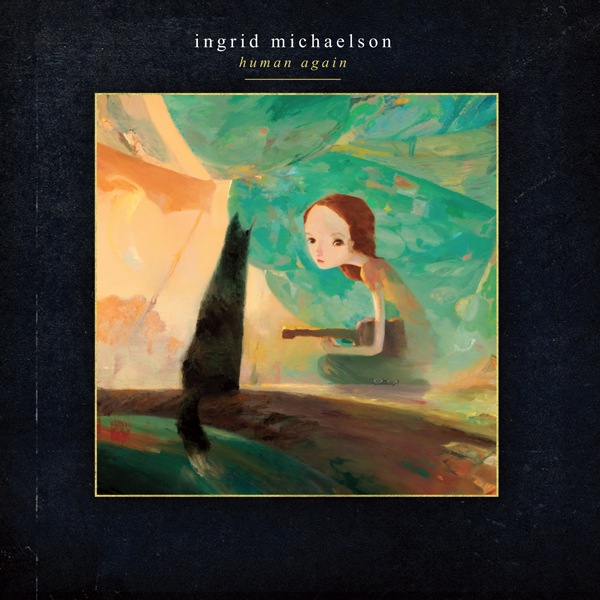Ingrid Michaelson’s latest album, Human Again, was released on January 24, following her album Everybody (2009). Her previous work has focused around the quirky, upbeat sound of melodies played on guitar, ukulele and occasionally piano, even when the subject matter of the lyrics delve into darker subjects. Human Again has definitely detoured from her typical sound. The opening song “Fire” introduces the album in a rush of up-tempo, complex string lines that propels the purity and strength of her voice forward. Immediately, the listener recognizes the shift from day-at-the-beach lightheartedness to something more intense and gritty than what has been heard on previous albums. Several other songs resonate with the same high energy instrumentation, for example the rock fueled “This Is War.” Then, of course, there are the slower, more pensive songs, such as “Ghost,” which reflects on the difficulties of moving on after heartbreak, and one of the closing songs “End of the World” which brings the album to a close on a bittersweet note as Michaelson begs the question of whether she is worth saving.
Human Again is not as completely out of the blue as people are making it out to be. Though the added dimensions that come with the string and bass elements may be somewhat surprising coming from the same artist that has brought us the sweet piano-oriented tracks from her earliest album, Slow the Rain and the quirky, guitar and ukulele-based tunes such as “You and I” and “Everybody” on her subsequent albums, Be OK and Everybody. Michaelson has exhibited a melancholy, more pensive side on many of her albums as well with the inclusion of songs such as “Porcelain Fists” and “So Long,” among many others.
Michaelson has hardly been a one dimensional artist through her career both in the public light and in her beginnings as a MySpace artist. Boys and Girls, the album that brought her to the spotlight after songs such as “Keep Breathing” and “The Way I Am” were featured on Grey’s Anatomy, was met with positive reviews for being easy to listen to, but far enough away from mainstream to not be overplayed. However, her later album Everybody was met with some criticism for many of the same reasons Human Again has been scrutinized. Michaelson described Everybody in an interview as “re-crafting the intimate feel of Girls and Boys with big sounds, big builds and big orchestrations.” The running theme of the album is tracking the progression of a volatile relationship and the experience of falling intensely in and out of love for the first time. For her, it was an exploration of events in her own life. Many felt that she had not achieved the departure that she was looking for, and perhaps she had not done enough to go in a different direction. There was a general sense of discomfort toward the kind of change in her voice she had been aiming for.
iTunes reviews of the album range from the words of satisfied fans to those complaining, “It sounds too much like what is played on the radio.” All of the negative reviews tend to revolve around the generalized and meaningless hipster concept of “selling out.” Fans are having a hard time coping with the fact that Michaelson has experienced growth as an artist that manifests itself in an even greater departure than her last attempt. As much as I love her earlier work focused around joy and lyricism, I also appreciate the fact that she has changed and is in the midst of developing a new voice that follows the growth of her fans.
Admittedly I was surprised by the differences in the tone of her work on my first listen. But it was surprise, not repulsion. I fear that people don’t realize that simply because she has created something completely different than what was expected of her doesn’t mean that she will abandon all previous work and standards. In the weeks leading up to the album’s release, Michaelson’s Facebook posts expressed her apprehension about how her new work would be received: “Waiting to release my record is tortuous. I just want it to be out in the world. Doubt blossoms when there is too much time to wait.” Upon the release of her album she wrote another post: “I just read some iTunes user reviews. It is crazy how some people HATE the record and some LOVE it. Such a divide. I know I shouldn’t read reviews… good or bad…funny how we take in the negative reviews more than the positive ones.” Just because Michaelson made the choice to add strings, electric guitars and bass does not mean she is “selling out.” It means that she has made an artistic choice that happens to include more than ukulele and piano. Each of us, musician or not, seeks the right to grow and progress. We want to make ourselves better, or if not better, at least understand the parts that have gone unexplored. Michaelson chose to do this through music. Just as she says in the number, “Blood Brothers,” “We’re all the same, under a different name.”










